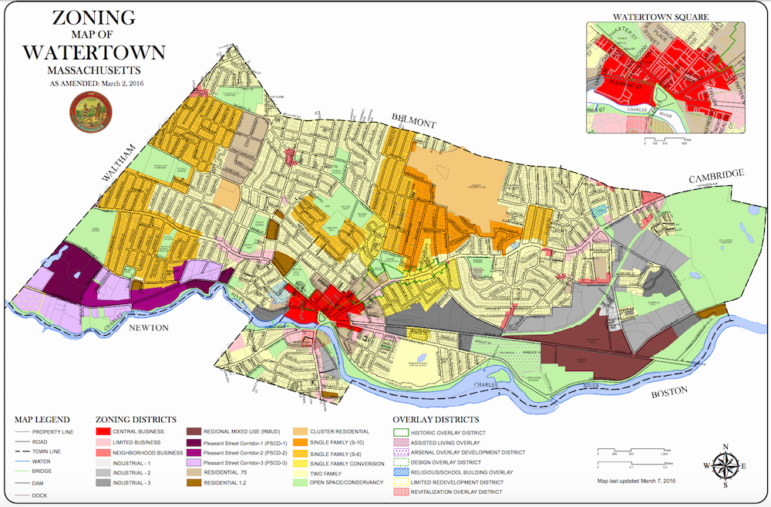
The Town Council will consider whether to start the process to change the Watertown Zoning Ordinance for four areas, including recreational marijuana facilities and solar requirements for new buildings.
On Sept. 25, 2018, the Council will consider whether to refer amendments to four areas of the Zoning Ordinance to the Planning Board. After the Planning Board makes recommendations on an amendment it would come back to the Town Council for final approval. The Council will meet at 7:15 p.m. in Town Hall.
Recreational Marijuana Facilities
Watertown allows medical marijuana facilities in certain areas and has approved one dispensary. In January, the Town Council voted to put a moratorium on Adult Use Marijuana, also called recreational marijuana, so that regulations could be developed. The proposed language for the Zoning Ordinance has been developed and will be considered by the Council.
The proposed Zoning Ordinance amendment for recreational marijuana retailers would require them to get a Special Permit from the permit granting authority — the Zoning Board of Appeals in most cases, or the Planning Board for areas such as the Regional Mixed Use District (RMUD) or Pleasant Street Corridor District (PSCD).
They would also be subject to most of the same requirements as a medical marijuana facility. Recreational marijuana facilities must be licensed by the state. In Watertown they would have to be more than 500 feet from an existing public or private school that has some or all grades K-12, as well as, from a treatment center for marijuana or other substance use. A medical or recreation marijuana dispensary cannot be less than 500 feet from another such facility.
A proposed change for both recreational and medical marijuana facilities is the removal of requirements to be at least 500 feet from daycare facilities or places where children commonly congregate.
Recreational marijuana facilities would be allowed in the following zoning districts: central business, limited business, industrial 1, industrial 2, industrial 3, PSCD and the RMUD.
Solar Requirements
New developments that are 10,000 sq. ft. or more, or residential projects with 10 or more units, would be required to install a solar energy system under a proposed zoning amendment. The solar systems would have to cover at least half the roof area, and, in the case of an uncovered parking garage, at least 90 percent of the roof area must be covered by the solar system.
The change comes after the changes were recommended by the Town Council’s Economic Development and Planning Committee in June.
There are some exceptions, including if there is no solar-ready zone, or the solar-ready area does not get sun at least 50 percent of daylight times. Also, there are safety rules, including that solar systems would not be placed so that it would prevent emergency access or would prevent smoke ventilation through the roof. In addition, solar systems will not be placed so that snow and ice would fall onto pedestrian areas.
Green Building Requirements
Another proposed zoning change would require green building standards for all new developments which require a Site Plan Review for approval.
The proposal would require the new developments to be able meet LEED (Leadership in Energy and Environmental Design) Silver certifiable standards. This means the projects would not have to go through the LEED certification process, but would have to take steps that would accumulate enough points to meet the LEED Silver standard to be certified.
Affordable Housing Requirements
The requirements for affordable housing would changed in the zoning ordinance to extend senior housing and assisted living facilities.
The proposed zoning amendment applies to new developments of more than five units of independent living and all assisted living facilities. Dementia care and skilled nursing units are exempted.
For independent living projects, 12.5 percent of units in a complex of 6 to 19 units must be affordable, and 15 percent for projects of 20 or more units must be affordable.
In assisted living projects, 5 percent of the units must be affordable in projects up to 75 units, and 10 percent must be affordable in complexes of 76 or more units.
See more details about all of the proposed Zoning amendments by clicking here.

